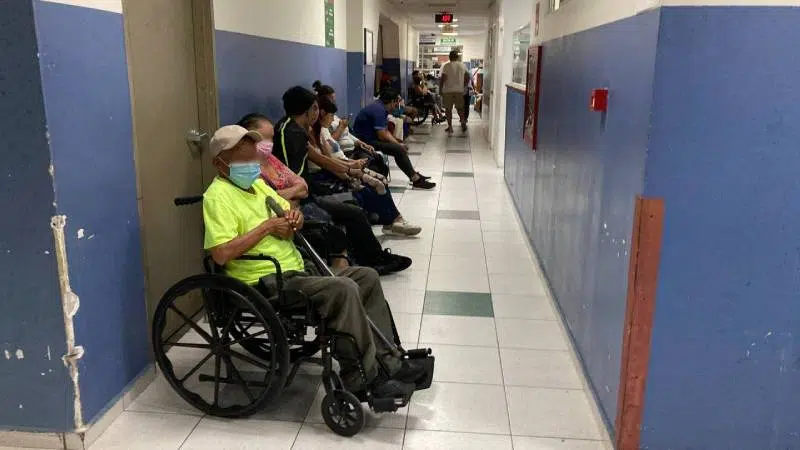Doctors from the Instituto Salvadoreño del Seguro Social (Salvadoran Social Security Institute, ISSS) reported last Friday a shortage of medication to treat epileptic patients, some of whom have experienced a relapse in their condition.
“We have been seeing epileptic patients for a few days now, and many of them were well-controlled, having gone two to three years without seizures. However, they have experienced seizures, and this has been in the context of shortages of many antiepileptic drugs,” stated a doctor who requested anonymity for fear of reprisals.
The source added that the medications reported to be in short supply include Keppra and Gabapentin, both used for epilepsy treatment.
“Several patients have said they haven’t received their medication, that they’ve received only half of it, and others report that when they go to request it, they are told it’s unavailable and their prescription is withheld. Others have to search for the medication at different Social Security pharmacies, and by the time they find it, their prescription has expired,” the doctor noted.
The doctor said that one of the beneficiaries who had not received their full medication had a seizure, which caused a fall resulting in facial trauma.
“A patient who had been seizure-free for eight years and was doing excellently, had a seizure in January of this year and unfortunately suffered facial trauma. The patient fell at home, injured their face, and required stitches. The patient was not receiving their medication at the normal dosage. This is worrying and disappointing,” the doctor emphasized.
LA PRENSA GRÁFICA has sent emails on many occasions to the ISSS director, Dr. Mónica Ayala, to inquire about the cause of the medication shortage at the institution. None of the inquiries have been answered.
The Sindicato de Médicos Trabajadores del Seguro Social (Union of Social Security Medical Workers, SIMETRISSS) stated on May 14 that medication shortages at the ISSS have been reported since November 2024.
Most of the drugs reported to be in shortest supply are those used to treat diabetes and arterial hypertension.
WHAT IS EPILEPSY?
Epilepsy is a chronic noncommunicable brain disease, according to the Organización Mundial de la Salud (World Health Organization, WHO). The organization’s 2024 data indicate that globally, nearly 50 million people suffer from this neurological disorder.
“Epilepsy is characterized by recurrent seizures, which are brief episodes of involuntary movement that may involve a part of the body (partial) or the entire body (generalized) and are sometimes accompanied by loss of consciousness and control of bowel or bladder function,” explains the WHO on its website.
The WHO further explains that seizures “are due to excessive electrical discharges in a group of brain cells that can occur in different parts of the brain. Seizures can range from very brief episodes of absence or muscle jerks to prolonged, severe convulsions. Their frequency can also vary from less than one per year to several per day.”
Denuncian escasez de medicinas para pacientes epilépticos en el ISSS
Médicos del Instituto Salvadoreño del Seguro Social (ISSS) denunciaron el pasado viernes escasez de medicamentos para tratar pacientes con epilepsia y algunos de estos han mostrado un retroceso en su condición.
“Hemos estado viendo pacientes con epilepsia hace algunos días y muchos de ellos estaban bien controlados, tenían entre dos y tres años sin convulsionar, pero han presentado crisis y ha sido en el contexto de desabastecimiento de muchos medicamentos antiepilépticos”, señaló un médico que pidió el anonimato por temor a represalias.
La fuente agregó que los medicamentos que reportan escasez son uno que se conoce como Keppra y Gabapentina, ambos son utilizados para el tratamiento de la epilepsia.
“Varios pacientes han dicho de que no han recibido su medicamento, que han recibido la mitad de su medicamento y otros que cuando van a solicitarlo les dicen que no hay y le retienen la receta. Otros tienen que andar buscando en diferentes farmacias del Seguro (Social) el medicamento y cuando llegan la receta ya está vencida”, señaló el médico.
El doctor dijo que uno de los derechohabientes que no había recibido su medicamento completo tuvo una convulsión, eso le provocó una caída que le causó un trauma en el rostro.
“Un paciente que tenía ocho años de no tener crisis, estaba excelente, y tuvo crisis en enero de este año y tuvo lastimosamente trauma facial. El paciente tuvo una caída en su casa donde se lastimó el rostro y le hicieron suturas. El paciente no estaba recibiendo un medicamento en su dosis normal. Esto es preocupante y decepcionante”, subrayó el médico.
LA PRENSA GRÁFICA ha enviado en muchas ocasiones correos electrónicos a la directora del ISSS, la doctora Mónica Ayala, para consultarle a qué se debe la escasez de medicamentos en la institución. Ninguna de las solicitudes ha sido contestada.
El Sindicato de Médicos Trabajadores del Seguro Social (SIMETRISSS) dijo el pasado 14 de mayo que la falta de medicinas en el ISSS se reporta desde noviembre de 2024.
La mayor parte de los fármacos que más escasez reportan son los que se utilizan para tratar la diabetes y la hipertensión arterial.
¿QUÉ ES LA EPILEPSIA?
La epilepsia es una enfermedad cerebral crónica no transmisible, de acuerdo a la Organización Mundial de la Salud (OMS). Datos de la entidad de 2024, señalan que a nivel mundial, cerca de 50 millones de personas sufren este trastorno neurológico.
“La epilepsia se caracteriza por convulsiones recurrentes, que son episodios breves de movimiento involuntario que pueden involucrar una parte del cuerpo (parcial) o todo el cuerpo (generalizado) y en ocasiones se acompañan de pérdida de conciencia y control de la función intestinal o vesical”, explica la OMS en su sitio web.
Y añade además de las convulsiones que “se deben a descargas eléctricas excesivas en un grupo de células cerebrales que pueden producirse en diferentes partes del cerebro. Las convulsiones pueden ir desde episodios muy breves de ausencia o de contracciones musculares hasta convulsiones prolongadas y graves. Su frecuencia también puede variar desde menos de una al año hasta varias al día”.

